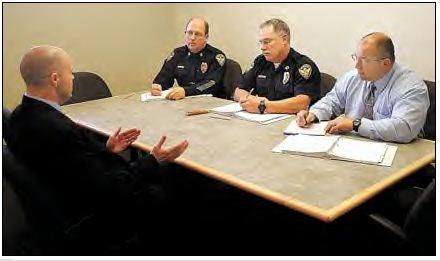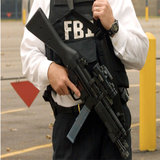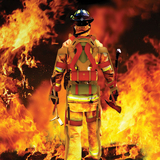How to Prepare for the Police Oral Board Interview Questions
The interview process for any job is the most critical element that will make (or break) your chances at
obtaining the job, and this is especially true for law enforcement positions. The main objective of the police oral boards is to weed out ill-prepared
candidates, and as a result, most applicants fail to advance beyond this interview. Here's some perspective: A top candidate could have a 4 year college degree, a
clean criminal background, top scores in both the physical and written tests, possess military or police experience, be the perfect fit, and
still not get hired, all because of a few mishaps during the oral board interview. Don't be that candidate!
There are some imperative do's and don'ts for having a successful police interview,
so make sure you attend any available training seminars and practice giving your reponses ahead of time. The key is to give an honest,
heart-felt response that falls within the acceptable parameters of the police decision-making process, which typically encompasses four key areas:
preparation, interpersonal sensitivity, independent decision-making, and oral communication. You also want the oral board panel to like you,
so be sure to avoid any clown-like behavior. Answer all of their questions thoroughly and know that it's OK to take a moment or two to compile
your thoughts before giving a reponse.

Most oral board panels consist of a team of three or four officers, usually a lieutenant or sergeant, 1-2 patrol or field training officers, and sometimes an HR or city council representative. The interviewers will generally ask you 2-3 short answer questions, 2-3 personal experience questions, and 3-5 situational-based questions. Most interviews will last between 20-40 minutes, depending on how thorough your answers are and any small talk or questions generated at the conclusion of the interview. Keep in mind that the more time you spend on preparing for the police interview, the more calm and confident you will appear to the panel. Once the department concludes the interview process, candidates will receive a score (usually out of 100) and will be ranked accordingly. This is why it's imperative to earn a high score on the interview and not just a passing grade! Those who rank at the top of the list will have the best chance at advancing to the background stage, one of the final steps to becoming a police officer.
Preparation Tips for the Oral Boards:
- Try to schedule a ride-along before the oral board review (scheduling one can take anywhere from a couple of weeks to a couple of months, so plan accordingly!)
- Try to get to know some of the people from the department ahead of time. If possible, take a tour of the department, stop by the department to ask questions, or get introduced by your ride-along partner.
- Get a haircut and be clean-shaven
- Dress to impress. Wear a dark suit with a subtle tie (blue, black, or gray)
- Avoid using any strong colognes or perfumes
- Cover any visible tattoos and avoid wearing any kind of piercings
- Research the department ahead of time and study the material found on the website
- Learn the names of the chief of police & mayor, the mission/vision statements, department goals, city demographics, recent police-related news, divisons & specializations, etc.
- Bring multiple copies of your resume, one for each interviewer (if applicable)
- Make flashcards of potential interview questions to help formulate concise answers
- Practice answering the more difficult questions with someone (preferably somebody you don't know very well so it feels more life-like) and be sure to ask for feedback
- Be on time, preferably 15 minutes early (you might have to fill out paperwork)
- Avoid trying to cram right before the interview. Arrive with a clear and open mind so that you can focus on the questions being asked.
- Avoid the 7 Deadly Sins of the Police Oral Board
- Leave your phone and any other unnecessary distractions in the car
During the Interview
- Try to relax before entering the interview room. Take 3 deep breaths.
- Be enthusiastic, make eye contact, give a firm handshake, and smile when greeted or spoken to
- Try to address the interviewers by their name and rank if you can remember them
- Be truthful. They are trained professionals and will find out if you are being deceptive
- Be confident (not to be confused with arrogant)
- Avoid looking down when answering questions (this can be viewed as deceptive)
- After giving an answer, they may question your answers, in attempt to get you to change your response. Don't fall for this trap! Stick to your original answer and give an explanation.
- Ask the interviewers 2-3 pertinent questions about the department (ie. How many people are you looking to hire, what is the next step in the process, etc.)
- Before finishing up, they may ask if there is anything else you would like to add. This is your opportunity to sell yourself and make a lasting final impression, as well as correct any answers that you think you may have answered poorly.
- Be sure to thank them for their time with a firm handshake and wish them well
- After completing the interview, consider sending the chief of police a Thank You letter, commending the oral board panel for their time & professionalism
Potential Police Interview Questions
-
Short Answer Questions
- Tell us about yourself.
- Why do you want a career in law enforcement?
- Have you applied to other law enforcement agencies? Which? Where do you stand?
- Why do you want to work for our department?
- What are 2-3 qualities that would make for a good police officer?
- What are 2-3 of your best qualities/strengths?
- What motivates you?
- How would your friends describe you?
- What are some of your weaknesses?
- Are you participating in any kind of personal fitness program?
- Where do you see yourself in the next 5 years?
- Have you been involved in any car accidents? How many driving infractions have you received?
- Who is the Mayor and Chief of Police in the region?
- What are some of your career goals?
- Do you work well with other people?
- Is there anything else you would like to add?
Personal Experience Questions
- What makes you a suitable candidate as a police officer?
- What is your greatest failure and what did you learn from it?
- What is your greatest accomplishment in life?
- Give us an example where you did NOT lose your cool in spite of the circumstances.
- Tell us about a time when you had to resolve a conflict with someone.
- Give us a situation when you had to deal with someone who was irate and/or hostile towards you.
- What are the sources of stress in your personal and professional life. How do you manage such stress?
- When have you had to take charge of a situation in order to resolve a problem?
- What have you learned from mistakes on the job?
- When was the last time you were criticized? How did you handle it?
- Tell us a time when you faced a major obstacle at work. How did you work through it?
- Tells us about your military experience (if applicable).
Situational-Based Questions
- You are investigating a crime scene and notice a wad of cash missing. You assume your partner took it. What do you do?
- A concerned citizen is upset that there are frequent speeders in the neighborhood and he/she wants you to do something about it. How do you respond?
- You are called to a school and when you arrive a man is pointing a gun at you. What do you do? What if it was a 12 year old pointing it at you?
- A superior officer orders you to do something that goes against policy and/or breaks the law. How do you react?
- There is a block party going on with about 200 people there. You receive an anonymous loud music complaint, in addition to a tip that there are gang members attending and they may be armed. How do you proceed?
- You are called to the scene of an accident in the middle of the freeway involving multiple vehicles. One of the persons involved is bleeding and appears to be seriously injured. How do you approach this situation?
- You pull over a car for not stopping at a stop sign. As you approach the vehicle, the person inside claims that the only reason that you pulled him/her over is because of their race. How do you respond?
- You and your partner are called to the scene of an armed robbery. As you investigate your partner gets shot and appears to be unconscious. The armed assailant take off on foot. What would you do next?
- You and your partner are responding to a call at a local convenience store. As you finish up the investigation and on your way out, you notice that your partner is eating a candy bar. You didn't see him pay for it. What, if anything, would you do?
- You and your partner are on patrol. As you are driving around, your partner is trying to make conversation, and continually uses racial slurs/derrogatory terms towards people of different races. How would you respond?
- You are on patrol at night a notice a car driving erratically. You pull the vehicle over and find out that the person is intoxicated. This person happens to be the chief of police. How would you handle the situation?
- You pull over a driver and ask to see his license. The driver refuses. What do you do next?
Now that you are a bit more familiar with the police interview process and some of the questions that may be asked, it's time to start preparing. Keep in mind that knowing the oral board questions ahead of time is only the tip of the iceberg for receiving a passing score. Knowing how to correctly answer the questions is the best way to set yourself apart and receive a high score on the police interview. The best way to do this is to learn from someone with extensive police experience.
Enter: Chief Ehlers, creator of Earn Your Badge and current police chief with over
30 years of law enforcement experience who has participated in hundreds of oral board panels.
Chief Ehlers has created an extensive online library with hundreds of video tutorials that teach police applicants the best way to answer potential interview questions, along with
preparation advice so you can stand out from the competition. With his program, Earn Your Badge, you can expect to receive expert guidance in the following areas:
- What TO do and say during the interview
- What NOT to do and say during the interview
- Pre-interview checklist
- Boosting your level of confidence
- Removing fear and confusion about the oral board interview
- How to outperform other candidates
- Giving the best interview of your life
To learn more EYB, visit the following: 7 Deadly Sins of the Police Oral Board
Continue Learning: Find out what the police academy training is like and how to get prepared.


